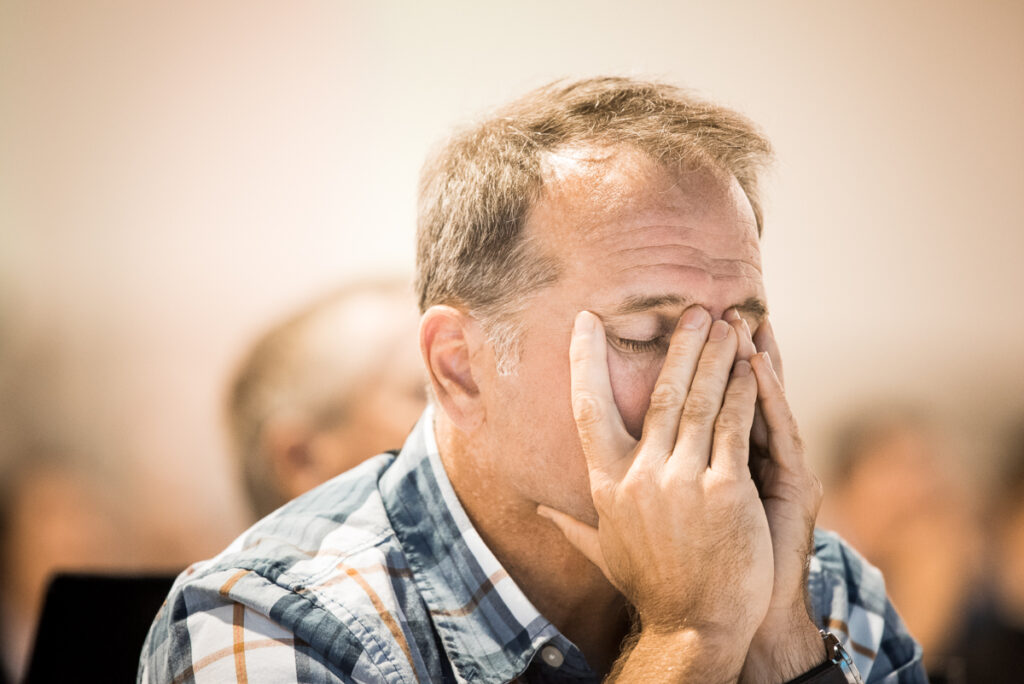
By Paula Schlueter Ross (paula.ross@lcms.org)
MILWAUKEE (July 11, 2016) — Delegates to the 66th Regular Convention of The Lutheran Church—Missouri Synod spent nearly an hour on Monday afternoon debating the merits of Resolution 12-01A — the top resolution presented by Floor Committee 12 on Ecclesiastical Supervision and Dispute Resolution — but ran out of time before they could vote on its adoption.
The resolution — based on a recent opinion of the Synod’s Commission on Constitutional Matters (CCM), which Floor Committee 12 Chairman Rev. Dr. John Wille has called “the Supreme Court of the LCMS” — “restores the right of [an] accuser to appeal when a district president fails to act or declines to suspend” a congregation member or Synod officer in matters of ecclesiastical supervision involving serious disciplinary action. Wille is president of the LCMS South Wisconsin District.
The original resolution (12-01) gave accusers the right to appeal to the LCMS Praesidium (made up of the Synod president and six vice-presidents) or, when a Synod church worker or officer is accused, the chairman of the Council of Presidents (made up of presidents of the church body’s 35 districts plus Praesidium members).
The amended resolution supports a return to a past LCMS practice (from 1956 to 1989) that leaves the responsibility for suspension or expulsion of a member or church worker in the hands of those charged with ecclesiastical supervision: namely, the LCMS president and the district presidents, who serve as the Synod president’s representatives for ecclesiastical supervision in their respective districts.
According to the CCM, the Praesidium has no authority for ecclesiastical supervision, so that authority should be returned to the LCMS president in cases of appeal. The amended resolution also removes the right of a district president to send appeal cases to a “referral panel” of three circuit visitors from his district.
Delegates failed to pass two motions from the floor: to refer the resolution to the COP for further study, and to delay action on the resolution until Tuesday (July 12) morning, when Floor Committee 12 will again present its resolutions to the convention. The votes on the two motions were 599-495 and 542-521, respectively.
Those who spoke against Resolution 12-01A included the Rev. Dr. John Denninger, president of the LCMS Southeastern District, who said he first learned of it when he received his convention materials. District presidents have not discussed the resolution, Denninger said, and should have that opportunity before endorsing such an “important” and “significant” change to the LCMS bylaws.
Another said it was evident by the applause for both the “pro” and “con” speakers that delegates were split “half and half” on the resolution, so “that’s exactly why we need to” study the resolution further, he added: “to work out these differences together.”
Still another “con” speaker noted that the resolution seems to “undermine” the authority of district presidents.
Those speaking in favor of the resolution said the matter is too important to delay further, and that the floor committee’s endorsement of the resolution — and the CCM’s recent opinion — is worthy of support.
“It’s time for us to have this conversation,” said a speaker “for” the resolution. “Today is the day.”
Jonathan Kohlmeier, a voting delegate from LCMS Iowa District East and a member of Floor Committee 12, said he believes convention delegates “will take action on the resolution tomorrow, for no other reason than they don’t want to prolong it any longer.”
Posted July 11, 2016
Learn more
Watch — Livestream and on-demand video
Read — Reporter Online | LCMS.org/convention
View — Photo galleries